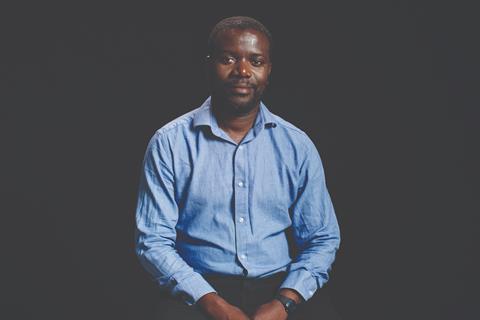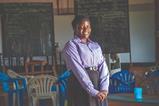Born in Uganda, Ronnie Mulema grew up stealing food to survive. But sponsorship through Compassion gave his whole family hope, and changed his life forever

I am the eldest of six children, and was born in Kampala, Uganda. I was only able to go to school intermittently; most times I would be sent home for lack of school fees. My parents also couldn’t afford to pay for school lunch, so I would go to friends at lunchtime and sit and hope. Most were generous, giving me a portion – so I got little bits from lots of people.
We normalised the fact that we didn’t have much food and found ways to get around that. Our main source of food was the university canteen near our home. I would wait for them to scrape the leftovers into what they might call a bin. For me, it was a food collection container.
A glimmer of hope
When I was nine, some people from the local church came to our school. Lots of names were called out, including mine. We thought we would be sent to the headteacher’s office, which essentially spelled bad news but, when we got there, we were given forms to fill in and told we were going to get sponsors. We didn’t understand what that meant, but it sounded like something good.
From that day, hope made its home in our house. One of the very first signs that things were going to change was when we were given a piece of paper and traced around our dusty feet because we were going to be given new shoes. I’d never had shoes.
A couple of weeks later, I walked home with a foam mattress, which was the first we’d had. I was given a blanket and mosquito net but, for me, the biggest change came from how I felt about myself. I felt valued. My performance at school started getting better. I would like to think this hope radiated to my siblings, to change the narrative we had believed, that our family would always be poor.
On Saturdays, we went to church for project day with the other children who had been sponsored: a healthy breakfast, then praise and worship and Bible study. In the afternoon, those that had received a letter from their sponsor would be given support to reply, those struggling academically would get help and we would learn skills such as basket weaving.
A new future
I still regard my sponsor as one of the greatest human beings that has ever been born. Before I was sponsored, I believed that somebody loved you because they wanted something from you. Suddenly, to have this person who’s provided a stable future for me, whatever she said to me, I held onto.
When I was twelve, she asked me what I wanted to do once I finished school. I felt compelled to think: I need to have a dream. I said I wanted to be a civil engineer, not knowing what that meant. I used to see these guys from the Department of Civil Engineering wearing jeans and trainers; they looked cool. Twelve years later, I graduated with a degree in civil engineering.
The biggest change came from how I felt about myself
Youth camps were organised by the church, and because I was sponsored by Compassion, they paid for me to attend. I’d heard the story of the Good Samaritan many times, but when I was 16, for the very first time I saw myself as the one who had been beaten up, and my sponsor had given money to the innkeeper, as it were, to make sure I was OK. I thought: Jesus is like that. I knew that I wanted to become a Christian, which I did that day.
After university, I started working for a building company. In 2007, my pastor saw how involved I was with the church and said: “We can raise money for you to go to England to New Wine and Soul Survivor; they’re really good conferences that equip people.” When I got to Shepton Mallet, I went into the shed and saw Compassion for the first time from the sponsor’s perspective.
I saw all these people talking to other strangers, asking: “Would you consider sponsoring a child?” I thought: They don’t know these children. They don’t know those people, but they’re talking to them for the purpose of each child. There and then, I knew I wanted to be an advocate for others.
A voice for the voiceless
I returned to Uganda but six months later I came back to England and joined All Saints Church in Peckham, London on an Urban Mission Placement, working voluntarily for two years.. I identified with some of the young, mainly Black boys who had a narrative about how their future would not amount to much due to their postcode, background or ethnicity. I kept thinking: That was me.
I eventually took a paid position as a children’s and youth worker at the church. This led me into working as a teaching assistant and, eventually, training as a teacher.
Whenever I can, I go to churches or conferences and share how God stopped the cycle of poverty in my family. Some people have asked me: “Why don’t you go back to Uganda? Your life was changed, and now you’ve got all these skills, why don’t you pass them on?” It is a legitimate question, but through my work with Compassion I am able to help a lot more children here than I would if I lived in Uganda. I’m speaking on their behalf, giving them a voice.
Ronnie was speaking to Claire Musters. To sponsor a child and change a life visit compassionuk.org







































No comments yet